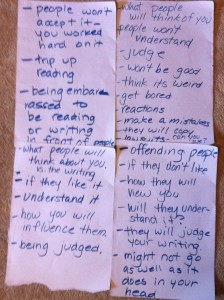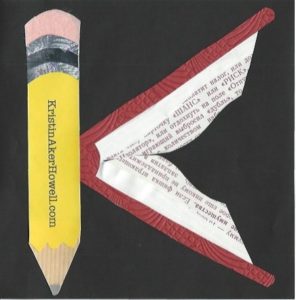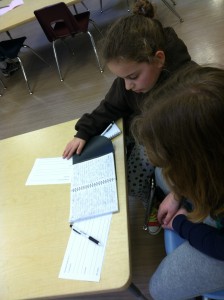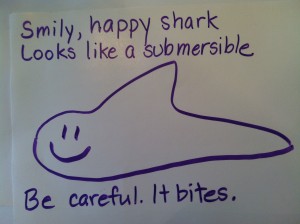Gone Fishing – A Novel for Second Graders
June 13, 2015 | Posted in Blog: Story Stories, Book Reviews, Libraries, libraries, teaching, writing | By Kristin
Comments Off on Gone Fishing – A Novel for Second Graders
Gone Fishing is a treasure for many reasons. First of all: kids love it. It has just enough mischief and naughtiness to spice up a read-a-loud and keep any reluctant reader turning pages. The sibling rivalry at the center of this story will hit home with anyone who has, well, had a sibling. Even for those of us who don’t normally fish, the slimy details keep us involved and invested because we identify with Sam and rejoice as he overcomes his frustrations and failures.
The second reason this book is such a treat you may not even notice up front: it’s a novel-in-verse. And what’s even better is that the audience is second and third grade, where we have a dearth of novels-in-verse. Gone Fishing is perfect for this age group because the subject matter is on-point emotionally: a younger sister horns in on her big brother’s fishing trip with dad. Even more appealing to teachers: the poetry is meticulous. After you’ve been through the book once to catch the plot, you will enjoy re-reading to enjoy Wissinger’s craft. Here, the various poetic forms reveal the emotions as true and entertaining, without being overwrought. And, each form is outlined in a neat appendix, handy for future – and practicing – poets.
Gone Fishing is a natural fit for the second grade English Language Arts Standards in Reading Literature. The story is told from two very different points of view – both Sam and Lucy – making this a perfect read to “speak in a different voice for each character when reading dialogue aloud (CCSS ELA Literacy 2.6).” This short book will help round out the range of complexity called for in the Standards (CCSS ELA Literacy 2.10) by introducing a wide variety of poetry.
Some students may be lucky enough to try writing some of their own poetry using the examples in the back of this book. Turning our complaints, failures and frustrations into entertaining poems can take a lot of the sting out of the curves we all get thrown every now and again. Kudos to Wissinger for setting this shining example of resiliency.
- Title Gone Fishing
- Author Tamera Will Wissinger
- Illustrator Matthew Cordell
- Copyright 2013
- ISBN 9780547820118
- Dewey Decimal Number Fic
- Reading Range 1-3 (2.6)
Cookies Conquer Fear
June 20, 2013 | Posted in Blog: Story Stories, teaching | By Kristin
Comments Off on Cookies Conquer Fear
As a Young Inklings and Hillview Author Author teacher, I have hosted thirty-one class parties over the last three years. I’ve heard nearly three hundred kids – Kindergarten through age fourteen – read their original stories out loud to an audience.
Each student created something unique, from her own imagination. This story – brand new to the world but very close to her heart – she shared with others, some of whom she did not know.
This takes incredible courage. For boys and girls alike.
I usually ask the teenagers to list their fears the week before the reading. This takes a lot of paper. Fears about reading original work aloud include: “people won’t understand you, tripping up reading, being judged, being misunderstood, tripping up and other variations on what others may think.”
We discuss each of the fears. Unfortunately, these are rational fears. I never promise kids that these things will not happen. They might.
We can’t control what others think. We make mistakes.
I don’t tell students this, but I’ve seen worse things happen: accidents, tears or uncontrolled giggles. It’s scary to face your greatest fears while everyone is watching you.
So, why do it?
Well, the kids in my elementary classes will tell you its because they get a cookie afterward. At each party every kid gets a cookie. They know this from day one. Each student reads the story she has written aloud to an audience of other students and, if elementary kids, also parents – usually about 15 – 30 people. We talk a lot about this cookie for the nine weeks leading up to the party.
When we have writer’s block because we can’t come up with the exactly perfect thing to write, we talk about the cookie, and how many weeks it is until cookies. This might be a good time to go ahead write anything: it doesn’t have to be perfect. It just has to be ready for when we have cookies together.
When we start to get scared about reading the story we have written out loud, we talk about how there will be cookies afterwards. No one will be thinking about us and whether our pants are zipped up, they will be thinking about when we have cookies together.
To be clear: these cookies are from Safeway.
Even though it’s all about the cookies, it’s not about the cookies at all.
It’s about the other part of the sentence: We will all have the cookies together.
It’s about faith. We need to know that all our effort, all our work will be valued by those around us. We need to know we matter. We need to be acknowledged. We will not be alone in the moment of our greatest vulnerability.
Promising friends and families cookies for that support seems like the least we can do. And, certainly, when kids are this courageous, they must know they we will be there for them at the end. When they face their fears – and they are substantial: rejection, judgment, and failure – we will be there.
And, we want to know everything will be OK on the other side.
The cookie is just our excuse.
And that’s just fine with me. These kids are brave enough as it is.
Plant a Seed
June 12, 2013 | Posted in Blog: Story Stories, teaching | By Kristin
Comments Off on Plant a Seed
A seed is full of genetic material. It contains a bit of food to get the next creation growing.
Without a seed, a writing class is a writing club.
After the fun, after the friends, a writing class needs a seed: a small, inspiring, critical component. I like to read a story. Usually I ask a question – or introduce an idea – before I read a story. That question – or idea – is the seed.
Before Audrey Wood’s Heckedy Peg we talked about foreshadowing. As I read the story to a group of second and third graders we discussed how the items children needed from the market foreshadowed what they became at the witch’s house, which foreshadowed how their mother saved them.
I asked: Did you foreshadow something in your story?
I never point out a lack of something in a child’s story. I know, from writing my own stories, that it is far too easy to shut down the creative process. I learn more by seeing new things in other stories. When I’m really lucky, I might make a connection to my own writing. When I’m fortunate as a teacher, one of my students might find his own connection.
After reading Heckedy Peg, I said, “Sometimes we give ourselves a gift at the beginning of our stories we forget. Maybe if we have trouble with an ending, we can re-read the beginning we have already written.”
“Oh!” said a second grade student, “I just thought of an idea for my story.”
That is my greatest hope for students when we read and discuss literature: that they will make a connection to their own writing. And, that this connection will help them to grow.
We Are Not Alone
June 10, 2013 | Posted in Blog: Story Stories, teaching | By Kristin
Kids who write need friends who write. Every writer needs friends. We need to be heard. Writing friends are special because they listen to our stories.
Friends believe us. They know the names of our characters, the places we’ve created and the challenges we face. They ask us questions. They cheer for us and laugh alongside us. They remind us about what we have forgotten.
I love to see kids sit next to each other in writing class. They don’t always read each other’s journals, but they frequently discuss their stories together.
Often, there is laughter.
It is lonely to make a new world. When we invite a friend – a real person – into this new place, we know we are not alone. Our friend has entered with us. She will help us get this place ready for other visitors: which is our greatest dream and biggest fear.
In writing class, many kids are ready to share their work immediately – sometimes we read to everyone at the end of the day – and some kids may take almost a year until they find someone they trust, or are ready to read to the group.
When a writer is afraid, often her friend will read her work aloud for her. This way she knows her work matters to us.
Sometimes our writing friends are the only ones who demonstrate that our work matters. Writing friends have many important jobs.
Writing friendships are delicate because writers tend to be sensitive. Something intended as an observation may be felt as a criticism. When spoken by one we trust, however, just such an observation can lead to growth. For example, a fourth grade student recently commented to another: “Your main characters are always girls.”
Instead of feeling hurt, this writer took the challenge. She wrote her next story outside of her comfort zone, with a fascinating new premise. The class begged to hear sections of her new story read aloud each week. When friends believe in us enough to listen carefully and tell the truth, everyone benefits.
We don’t need 500 friends. Anyone – kids or adults – would be lucky to have one or two true friends.
Let’s Mandate Fun
June 7, 2013 | Posted in Blog: Story Stories, teaching | By Kristin
Comments Off on Let’s Mandate Fun
Creating something from nothing. Marjorie Frank calls it “romance.” Naomi Kinsman Downing calls it “play.” Some call it “foreplay.” No matter what you call it, it’s an essential start to the writing process.
One must get one’s creative juices flowing, so to speak. But I’ll stick with the PG version: Fun. Writing starts with fun. If you’re not having it, most likely you’re staring at a blank page or computer screen.
The same goes for teaching a writing class. Kids can’t write if they are not having fun. If the kids aren’t having fun, you’ve got a class full of kids ripping up paper, playing light sabers with pencils, crawling under desks, or using up all the anti-bacterial gel.
In short, kids will make their own fun. And it won’t be fun for you.
Fun is paramount. If I could, I’d make fun mandatory. For teachers. Forget the kids, man. If we’re having fun, so are they.
Naomi Kinsman Downing, Founder and Creative Director of Society of Young Inklings, articulates it this way.
“The freedom associated with letting go, being silly, breaking patterns, is the very thing most likely to bring new ideas and insight. Play isn’t trivial. It’s vital.”
She’s right. How often have you been unable to solve a problem as you sit for hours at your computer? Miraculously, when you release your mind from it – sew, garden, shower, feed the kittens – a brand new idea may come.
Play frees. We need fun to create. The first book I bought about writing was called “If You’re Trying to Teach Kids How to Write You Gotta Have This Book.” It was written by Marjorie Frank and published in 1979. I kept it on my desk when I began teaching over twenty years ago. I still have it on my desk now.
In her chapter titled “Romance,” Frank say this:
“Experiences – with self, with others, with literature, with arts, are the catalysts that ignite expression…PLEASE, don’t ask kids to write without giving them some input!…SOMETHING romantic needs to proceed the writing assignment: some happening that jars loose the poetry inside their heads and sets free a flow of new ideas.”
As a teacher, mostly I can figure out what will be fun for kids. Usually its what’s fun for me: playing a silly game, reading a book, making detailed observations of art or life, experiencing art, or sharing interesting information. Today we drew silly pictures – starting with a scribble – then wrote haikus together. We had fun trying to make sense of our pictures, within the syllable count of haiku.
When an activity is no longer fun, sometimes a kid will ask, “Can we just go write?”
I’ve never said, “No,” to that question. Sometimes, writing is more fun than a game, or a story, or whatever else I’ve brought for the day. Sometimes, that question means the game, or story, or photo did its job.
Each writing session is a chance for joy. If you’re not having fun while you’re teaching writing, stop. Do something that sounds fun. To you. Its vital.
It should be mandatory.



